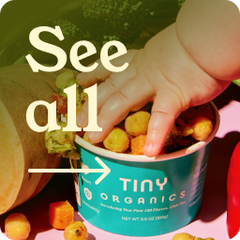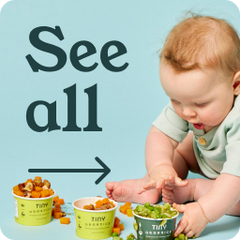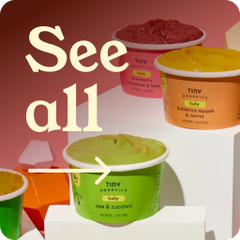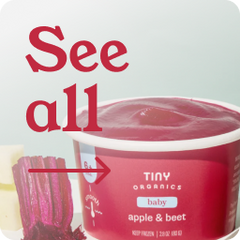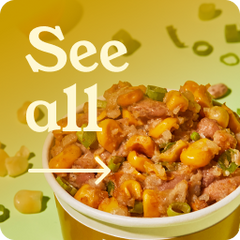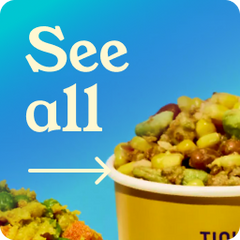Tiny Feeding Guide: 6 - 8 Months

- You don’t have to choose between purees and finger foods/baby-led weaning. Do what feels most natural to you and your baby. Or do both!
- Your little one is eating more, 2 to 3 meals a day and can start to experiment with a variety of textures.
- Time to investigate your baby's poo!
- Research has shown that between 4-7 months of age infants are more open to tasting more flavors and textures than they will be throughout all of childhood.
Development at this age...
At this age, babies still need breast milk or formula as their primary source of nutrition. Solid foods may be offered a couple of times per day as a supplement, or simply as enrichment. Make mealtime low-key and fun…this is a perfect time to let little ones play with their food! Don’t worry if your baby seems to have little interest in solids. That’s completely normal too.
At this age, babies might be holding their own bottle. They're usually developing a pincer grasp too, making this the perfect time to practice self-feeding with bite-sized pieces of soft food. Babies begin to sit unaided during these months, and often develop an interest in feeding themselves.
We at Tiny believe that finger foods are a great way to build smart eaters for the future. It's all about creating a healthy relationship with food and reducing picky eating later in life. Finger foods teach your baby dexterity and encourage them to explore new flavors, textures, and smells. Exposure to different flavors and coarser textures early on in life makes your baby a more adventurous eater and encourages your baby or toddler to adjust portion sizes to match their hunger.
However, we are certainly not here to say “finger foods are the only way.”
We believe that parents should do what works for them. You don’t have to choose between purees or finger foods / Baby-Led Weaning. Do what feels most natural to you and your baby. (Or do both!) The main goal here is to encourage growth and development through all the nutrients your growing baby needs (e.g. iron, calcium, zinc) and to create a lifelong healthy relationship with food.
At this age, it may seem like more food ends up smashed on the table, in your baby's hand, or in hair (yours and hers!) than gets eaten. Our advice: embrace the mess. The more little ones explore food and develop feeding skills, the better.
PRO TIP: Suit up! Invest in a bib that’s waterproof, easy to wash, catches the food and covers your baby’s clothes (or go bare tummy if your little one’s eating just before bath time!).
This is the time to start investigating your baby's poo. (This will be one of those things you probably never thought you'd do. Similar to sucking the snot out of your baby's nose with a Nose Frida! Things we do for love ;) Yellow = she's mainly playing with food and not eating much of it (which is good! You want her to play with her food at this stage), Yellowish = he's still mainly consuming milk, Brown = she's eating and digesting more whole foods (great!!)
How much?
Your baby’s portion sizes will increase as he grows. Between 6-8 months you should:
- Continue offering breast milk or formula regularly and before solids. Babies should still consume 24-48 ounces throughout the day.
- Offer 2-3 solid “meals” per day. This can be 3-4 tablespoons of food, diluted with breast milk, formula, or water as necessary.
You may also consider offering a sippy cup of water at this age. We recommend you introduce sippy cups with water only before 12 months of age, reserving breastmilk or formula for breast or bottle. The purpose of introducing a sippy cup is to practice grasping the cup and pulling it to baby's mouth. Water (not juice!) is the perfect starter liquid but always offer the cup after meals, so your little one doesn't fill up on liquid. We like soft silicone spouts that are easy to gum and suck on.
Good foods for this age:
- Steamed veggies: carrots, zucchini, sweet potato, yam, root vegetables (parsnips, carrots, turnips), spinach, kale, swiss chard, green beans, butternut/summer squash, winter squash, broccoli, cauliflower, peas, asparagus, beets, bell peppers
- Fruits: avocado, banana, apple, pear, pumpkin, raspberries, peaches, nectarines, plums, apricots, cherries, prunes, figs, dates, cranberries, mango, papaya, melon
- Grains/Beans: chickpeas, black beans, edamame (*contains soy), fava beans, black-eyed peas, lentils, kidney beans, oatmeal, couscous, quinoa
Tiny Organics offers plant-based, organics meals for your little one. Our NEW Tiny Beginnings meals are baby-led weaning compatible finger foods perfect for little ones 4+ months and can help you raise an adventurous, healthy eater for life. Try Tiny today.










